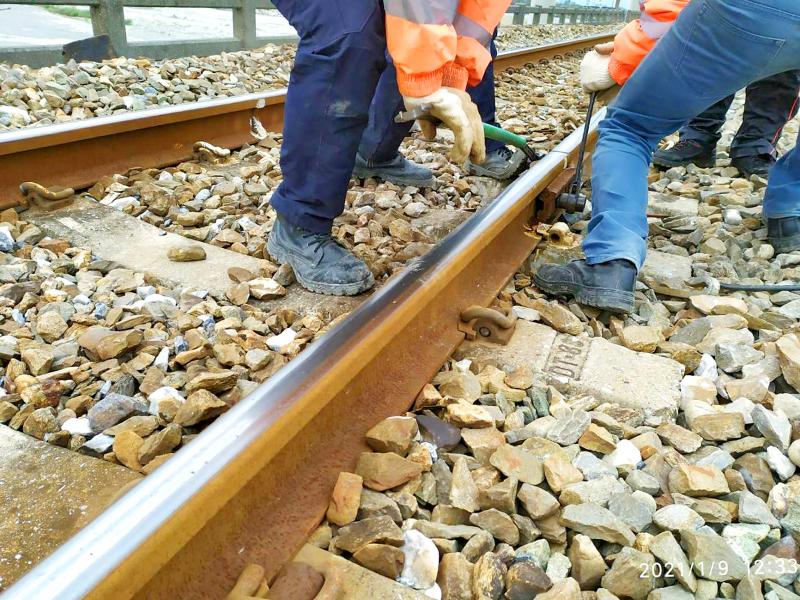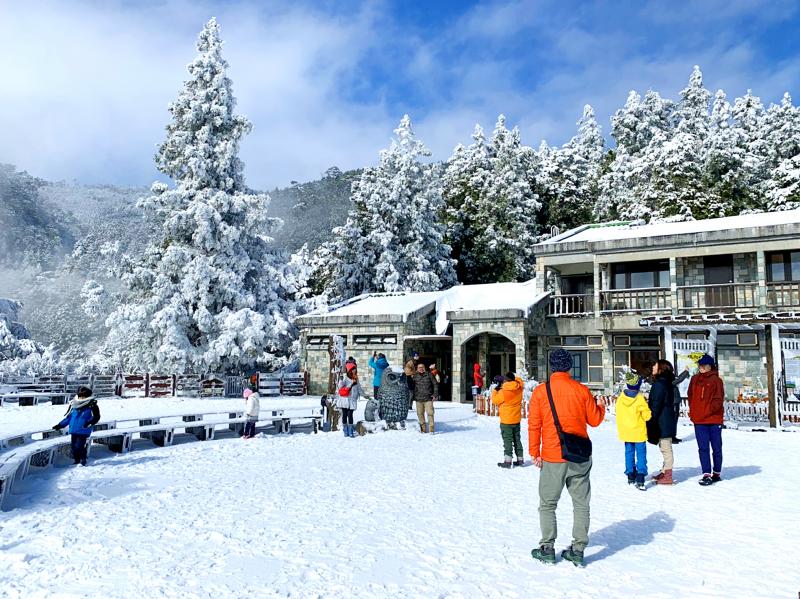The Taiwan Railways Administration (TRA) is to step up inspections of tracks and double down on compliance with railway repair standard operating procedures (SOPs) to maximize railway safety, Minister of Transportation and Communications Lin Chia-lung (林佳龍) said yesterday.
The comments came after TRA personnel reported three separate instances of cracked rails since Thursday, when a cold air mass reached Taiwan.
Cracked rails were found on Thursday between Yunlin County’s Douliou City (斗六) and Dounan Township (斗南), and on Friday on the Hualien-Taitung line, and between Taitung County’s Chihshang Township (池上) and Hualien County’s Fuli Township (富里), the TRA said.

Photo courtesy of the Taiwan Railways Administration
Yesterday, cracked rails were found between Hualien County’s Heping Township (和平) and Yilan County’s Hanben (漢本), it said.
The TRA said that it fixed Thursday’s and Friday’s cracked rails by replacing the tracks, and that it planned to replace yesterday’s cracked rails last night.
It said that the rails were likely damaged by the rapid drop in temperatures, but added that investigations are being conducted.

Photo courtesy of the Luodong Forest District Office
TRA personnel are to be lauded for reporting the damaged lines and observing SOPs so that trains could continue their routes at a decreased speed when passing through the area, Lin said, adding that the TRA’s rapid rail repairs — within 24 hours — were also to be commended.
Yesterday, the Central Weather Bureau said that the cold surge would continue to affect the nation’s weather through today, when temperatures are forecast to rise slightly.
Temperatures would remain below 12°C for 24 hours, the bureau said, adding that cold warnings had been issued for most regions, with ground-level temperatures either falling below 6°C, an “orange” alert, or below 10°C, a “yellow” alert.
There is likely to be less moisture, and showers could be limited to the eastern and mountainous areas of Taiwan, it added.
Another cold front could hit Taiwan tomorrow, resulting in overnight temperatures of 8°C in low-lying areas of northern Taiwan, said Daniel Wu (吳德榮), a meteorologist and adjunct associate professor of atmospheric science at National Central University.
That could bring more snow to Yilan County’s Taipingshan (太平山), he added.
A traffic jam occurred yesterday on Taipingshan, as people flocked to the mountain to see snow.
Beginning to arrive early in the morning, tourists lined up at the gate to the area, until there was a line 6km long, or 1,000 vehicles, and the Taipingshan National Forest Recreation Area blocked any more from approaching, recreation area official Huang Hsin-wei (黃信偉) said.
The 1,900m mountain had an accumulation of 15cm of snow by yesterday morning amid the drop in temperature, Huang said.

FREEDOM OF NAVIGATION: The UK would continue to reinforce ties with Taiwan ‘in a wide range of areas’ as a part of a ‘strong unofficial relationship,’ a paper said The UK plans to conduct more freedom of navigation operations in the Taiwan Strait and the South China Sea, British Secretary of State for Foreign, Commonwealth and Development Affairs David Lammy told the British House of Commons on Tuesday. British Member of Parliament Desmond Swayne said that the Royal Navy’s HMS Spey had passed through the Taiwan Strait “in pursuit of vital international freedom of navigation in the South China Sea.” Swayne asked Lammy whether he agreed that it was “proper and lawful” to do so, and if the UK would continue to carry out similar operations. Lammy replied “yes” to both questions. The

SECOND SPEECH: All political parties should work together to defend democracy, protect Taiwan and resist the CCP, despite their differences, the president said President William Lai (賴清德) yesterday discussed how pro-Taiwan and pro-Republic of China (ROC) groups can agree to maintain solidarity on the issue of protecting Taiwan and resisting the Chinese Communist Party (CCP). The talk, delivered last night at Taoyuan’s Hakka Youth Association, was the second in a series of 10 that Lai is scheduled to give across Taiwan. Citing Taiwanese democracy pioneer Chiang Wei-shui’s (蔣渭水) slogan that solidarity brings strength, Lai said it was a call for political parties to find consensus amid disagreements on behalf of bettering the nation. All political parties should work together to defend democracy, protect Taiwan and resist

By refusing to agree spending increases to appease US President Donald Trump, Spanish Prime Minister Pedro Sanchez threatened to derail a summit that NATO Secretary-General Mark Rutte needs to run smoothly for the sake of the military alliance’s future survival. Ahead of yesterday’s gathering in The Hague, Netherlands, things were going off the rails. European officials have expressed irritation at the spoiler role that Sanchez is playing when their No. 1 task is to line up behind a pledge to raise defense spending to 5 percent of GDP. Rutte needed to keep Spain in line while preventing others such as Slovakia

SHIFT PRIORITIES: The US should first help Taiwan respond to actions China is already taking, instead of focusing too heavily on deterring a large-scale invasion, an expert said US Air Force leaders on Thursday voiced concerns about the Chinese People’s Liberation Army’s (PLA) missile capabilities and its development of a “kill web,” and said that the US Department of Defense’s budget request for next year prioritizes bolstering defenses in the Indo-Pacific region due to the increasing threat posed by China. US experts said that a full-scale Chinese invasion of Taiwan is risky and unlikely, with Beijing more likely to pursue coercive tactics such as political warfare or blockades to achieve its goals. Senior air force and US Space Force leaders, including US Secretary of the Air Force Troy Meink and